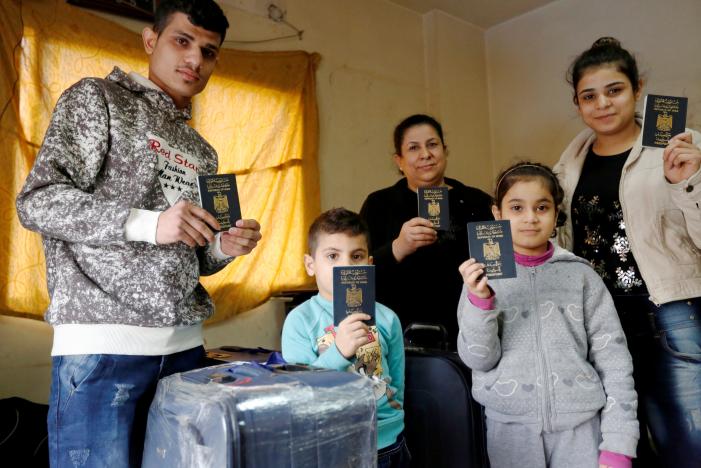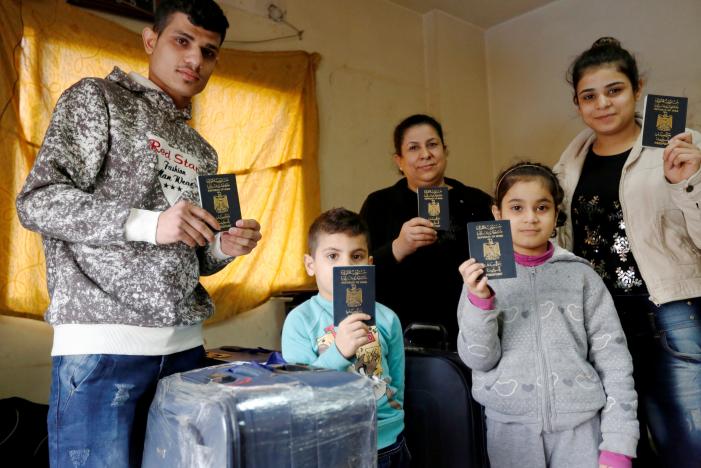Middle East travellers rush to take advantage of Trump setback

Iraqi refugee Nizar Kassab and his family pose for pictures with their passports in their temporary home in Beirut, Lebanon February 4, 2017. REUTERS/ Jamal Saidi

The ruling gave hope to many travellers and sent some scrambling for tickets, worried that the newly opened window might not last long. Trump denounced the judge on Twitter and said the decision would be quashed.
“The opinion of this so-called judge, which essentially takes law-enforcement away from our country, is ridiculous and will be overturned!” the president said.
The travel ban, which Trump says is needed to protect the United States against Islamist militants, has sparked travel chaos around the world and condemnation by rights groups who have called it racist and discriminatory.
“Interesting that certain Middle-Eastern countries agree with the ban. They know if certain people are allowed in it’s death & destruction!” Trump tweeted. “When a country is no longer able to say who can, and who cannot, come in & out, especially for reasons of safety & security – big trouble!”
In the wake of Friday’s ruling, Qatar Airways was the first to say it would allow passengers from Iran, Iraq, Libya, Somalia, Sudan, Syria and Yemen to resume flying to U.S. cities if they had valid documents.
Fellow Gulf carriers Etihad and Emirates said they would do the same, as did others including British Airways, Air France, Spain’s Iberia and Germany’s Lufthansa.
“I am very happy that we are going to travel today. Finally, we made it,” said Fuad Sharef, an Iraqi with an immigration visa who was prevented along with his family from boarding a flight to New York a week ago.
“We were right, we are legal. Even at that time, I was optimistic. I was sure that we were going to go. I didn’t surrender and I fought for my right and other people’s right,” he told Reuters.
The family was due to fly on Turkish Airlines later on Saturday from Erbil, the capital of the Kurdish region of northern Iraq, to Istanbul and then to New York, before starting a new life in Nashville, Tennessee.
Officials in Lebanon and Jordan, however, said they had received no new instructions regarding the Jan. 27 travel ban.
A spokeswoman for budget airline Norwegian, which operates transatlantic flights including from London and Oslo, said the situation was “still very unclear”.
Some travellers interviewed in Middle Eastern capitals were cautious about the news of Friday’s ruling, which the White House said it planned to appeal as soon as possible.
Ibrahim Ghaith, a Syrian barber who fled Damascus in 2013, told Reuters in Jordan: “Today we heard that the measures may have been abolished but we are not sure if this is just talk. If they go back on the decision, people will be overjoyed.”
Iraqi refugee Nizar al-Qassab told Reuters in Lebanon: “If it really has been frozen, I thank God, because my wife and children should have been in America by now.”
The 52-year-old said his family had been due to travel to the United States for resettlement on Jan. 31. The trip was cancelled two days before that, and he was now waiting for a phone call from U.N. officials overseeing their case. “It’s in God’s hands,” he said.
Two Sudanese travellers told Reuters they were trying to travel as soon as possible, fearing the ban might be reinstated. They declined to be named, for fear of possible consequences.
“I’m in a race against time,” said a 31-year-old female academic who said international airlines were still refusing to sell her a ticket. “Now I am going from one airline company to another to convince them about the court’s decision.”
In Cairo, aviation sources said Egypt Air and other airlines had told their sales offices of Friday’s ruling and would allow people previously affected by the ban to book flights.
But for some who had changed their travel plans following the ban, the order was not enough reassurance.
Josephine Abu Assaleh, who was stopped from entering the United States last week with five members of her family, was hesitant to express any hope in the court ruling as she awaited word from her lawyers.
“I will not say if I have hope or not. I wait, watch, and then I build my hopes. We left the matter with the lawyers. When they tell us the decision has been cancelled, we will decide whether to go back or not,” she told Reuters in Damascus, speaking by telephone.
Abu Assaleh, 60, and her family only learnt of Trump’s order after landing at Philadelphia International Airport with U.S. visas that were granted in 2016, some 13 years after they initially made their applications.
VISA SUSPENSIONS
Trump’s order caused chaos at airports across the United States last week. Virtually all refugees were also barred, upending the lives of thousands of people who had spent years seeking asylum in the U.S.
The State Department said on Friday that almost 60,000 visas were suspended following Trump’s order. It was not clear whether that suspension was automatically revoked or what reception travelers with such visas might get at U.S. airports.
The Washington state lawsuit was the first to test the broad constitutionality of Trump’s executive order. Judge James Robart, a George W. Bush appointee, explicitly made his ruling apply across the country, while other judges in similar cases have so far issued orders concerning only specific individuals.
Washington Governor Jay Inslee celebrated the decision as a victory for the state, adding: “No person – not even the president – is above the law.”
The case was based on claims that the state had suffered harm from the travel ban, for example students and faculty at state-funded universities being stranded overseas. Amazon.com and Expedia, both based in Washington state, had supported the lawsuit, asserting that the travel restrictions harmed their businesses.
Tech companies, which rely on talent from around the world, have been increasingly outspoken in their opposition to the Trump administration’s anti-immigrant policies.
Judge Robart questioned the use of the Sept. 11, 2001, attacks on the United States as a justification for the ban, saying no attacks had been carried out on U.S. soil by individuals from the seven affected countries since then.
For Trump’s order to be constitutional, Robart said, it had to be “based in fact, as opposed to fiction.”
The White House said in a statement: “At the earliest possible time, the Department of Justice intends to file an emergency stay of this outrageous order and defend the executive order of the president, which we believe is lawful and appropriate.”
It added: “The president’s order is intended to protect the homeland and he has the constitutional authority and responsibility to protect the American people.”
